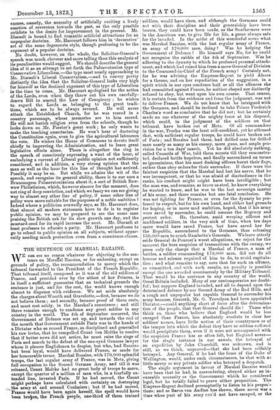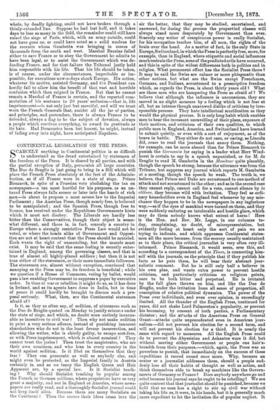.1.11k, *SENTENCE ON MARSHA.L BAZAINE. teanenc:eLliMo arreastoin
Bwhateveraz airi e o r f for r objectingendon endorsing, to except t he s eonn- grounds of policy, the recommendation to mercy whichthe tribunal forwarded to the President of the French Republic. That tribunal itself, composed as it was of the old soldiers of France, and presided over by the ablest of her Princes, is in itself a sufficient guarantee that on technical grounds the sentence is just, and for the rest, the world knows enough almost to dispense with evidence. We set aside absolutely the charges about Woerth and Gravelotte,—first, because we do not believe them; and secondly, because proof of them rests and must rest solely, in the Marshal's conscience; and still there remains enough to condemn any great soldier in any colintry in the world. The 4th of September occurred, the Government of Defence was set up, and towards the end of the month that Government outside Paris was in the hands of a Dictator who so roused France, so disciplined and generalled his raw levies, that he compelled Count von Moltke to resolve that if better news did not arrive, he must raise the siege of Paris and march to the defeat of the one-eyed Genoese lawyer whom it pleases Englishmen to despise, but who, had Bazaine bat been loyal, would have delivered France, or made for her honourable terms. Marshal Bazaine, with 170,000 splendid troops, the last regular 'army of France, was in Metz giving full occupation to the Second German Army, and till it was released, Count Moltke had no great body of troops to move, except the quarter of a million of men who, in a fearfully ex- tended line, invested Paris. If he had moved, the Count might perhaps have calculated with certainty on destroying c,the army at and around Coulmiers • but if he had moved, Prance would have been again herself, the spell would have been brolien, the French people, one-third of them trained soldiers, would have risen, and although- the Germans could not with their discipline and their generalship have been . beaten, they could have been made, as the Southerners were in the American war, to give life for life, a game always safe for the invaded. In the midst of this wonderful scene what was Marshal Bazaine, with the last regular army of France, an army of 170,000 men, doing? Was he helping the Government of Defence? He himself says No, for he could not recognise the rabble of the 4th of September. Was he adhering to the dynasty to which he professed personal attach- ment, and which had raised him from a mere General of Division to the Command-in-Chief of the French army? Certainly not, for he was advising the Empress-Regent to yield Alsace for a throne, and on her repudiation of the suggestion, in a spirit which in our eyes condones half or all the offences she had committed against France, he neither obeyed nor distinctly refused to obey, but went upon his own course. That course, it is certain from the evidence and from the judgment, was not to deliver France. We do not know that he intrigued with the Germans, and should be inclined to take Prince Frederick Charles's word as conclusive that he did not; but he certainly made no use whatever of the mighty force at his disposal, which could, in the judgment of the soldiers on that tribunal, have broken out of Metz. Of all commanders in the war, Trochu was the least self-confident, yet he affirmed that, with sufficient regular troops, he could have broken out of Paris; and Bazaine had them, had drilled man for drilled man nearly as many as his enemy, more guns, and ample pro- vision for a ten days' march. Yet he did absolutely nothing, called Councils of War, told them secrets till they remonstra- ted, declared battle hopeless, and finally surrendered on terms so ignominious, that his most dashing officers burnt their flags, rather than obey orders for their surrender. If there were the faintest suspicion that the Marshal had lost his nerve, that he was incompetent, or that he was afraid of disobedience in the ranks, his conduct might might have been intelligible; but the man was, and remains, as brave as steel, he knew everything he wanted to know, and he was to the last sovereign master of his army, and there remains but one fatal conclusion. He was not fighting for France, or even for the dynasty he pro- fessed to respect, but for his own hand, and either had grounds for hoping, or in mere mad ambition, hoped, that if his army were saved by surrender, he could assume the Regency and protect order. He, therefore, amid weeping officers and maddened soldiers, in the very nick of time, when ten days more would have saved France, but have saved her for the Republic, surrendered to the Germans, thus releasing 150,000 men to crush Gambetta's Generals. We leave utterly aside General de Pourcet's worst allegations, we reject for the moment the bare suspicion of transactions with the enemy, we press only the charge that a Marshal of France, a man of battles, a soldier commanding 170,000 men, did not do all honour and science required of him to do, to avoid capitula- tion; and what remains to say, save that for such an offence, so committed, and with such results, no penalty is possible except the one awarded unanimously by the Military Tribunal. That would be the sentence in any country of the world, Great Britain included. Many of our contemporaries are doubt- ful; but suppose England invaded, and all to depend upon the determined defence by our Second Army of the Red Hills, and a rough and unpopular but capable General to surrender his army because, forsooth, Mr. G. Trevelyan had been appointed Dictator,—could anything short of force alter the determina- tion of the people, that that General should die? Those who think so, those who believe that England would be less enraged than France, less absolutely resolute to clear her soldiers' names, have little notion of their countrymen or of the temper into which the defeat they have so seldom suffered would precipitate them, even if it were not accompanied with the suspicion Franca has so often felt, but England never— for the single instance in our annals, the betrayal of an expedition by John Churchill, was unknown, and is still, as we think, unproved—that she had been selfishly betrayed. Any General, if he had the fame of the Duke of Wellington, would, under such circumstances, be shot with a3 little mercy as any private soldier who betrayed a despatch. The single argument in favour of Marshal Bazaine would have been that he had, in surrendering, obeyed either an in- exorable necessity or the Government which he considered legal, but he totally failed to prove either proposition. The Empress-Regent declined peremptorily to listen to his propos'. dons ; and as Baron von Andlan has shown, there never was a time when part of his army cou'd not have escaped, or the
whole, by deadly fighting, could not have broken through a thinly-extended line. Suppose he had lost half, and it takes days to lose so many in the field, the remainder could still have raised the siege of Paris, which, with an army outside, could not have gone on, or could have acted as a solid nucleus for the recruits whom Gambetta was bringing in scores of thousands from the south and west. Marshal Bazaine failed either to save France or to obey the Government he admits to have been legal, or to assist the Government which was de- fending France, and for that failure the Tribunal justly held him responsible with his life. That his life should be taken, is of course, under the circumstances, improbable or im- possible, for executions now-a-days shock Europe. His action, whatever its motive, assisted Germany, and the President can hardly fail to allow him the benefit of that vast and horrible .confusion which then reigned in France. But that he cannot remain a Marshal of France is certain, and the reported com- mutation of his sentence to 20 years' seclusion—that is, life imprisonment—is not only just but merciful, and will we trust warn the French Generals that, amidst all the jar of parties, and principles, and pretenders, there is always France to be defended, always a flag to be the subject of devotion, always a people which survives everything, to award its gratitude or its hate. Had Dumouriez been but honest, he might, instead of fading away into night, have anticipated Napoleon.











































 Previous page
Previous page